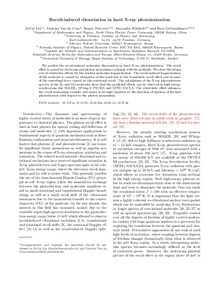Показать сокращенную информацию
Recoil-induced dissociation in hard-x-ray photoionization
| Автор | Ji-Cai, Liu | |
| Автор | Vinícius Vaz, Da Cruz | |
| Автор | Sergey, Polyutov | |
| Автор | Alexander, Föhlisch | |
| Автор | Гельмуханов, Фарис Хафизович | |
| Дата внесения | 2021-08-13T09:30:43Z | |
| Дата, когда ресурс стал доступен | 2021-08-13T09:30:43Z | |
| Дата публикации | 2019-11 | |
| Библиографическое описание | Ji-Cai, Liu. Recoil-induced dissociation in hard-x-ray photoionization [Текст] / Liu Ji-Cai, Da Cruz Vinícius Vaz, Polyutov Sergey, Föhlisch Alexander, Фарис Хафизович Гельмуханов // Physical Review A - Atomic, Molecular, and Optical Physics. — 2019. — Т. 100 (№ 15). | |
| ISSN | 10502947 | |
| URI (для ссылок/цитирований) | https://journals.aps.org/pra/abstract/10.1103/PhysRevA.100.053408 | |
| URI (для ссылок/цитирований) | https://elib.sfu-kras.ru/handle/2311/142526 | |
| Аннотация | We predict the recoil-induced molecular dissociation in hard-x-ray photoionization. The recoil effect is caused by electronic and photon momentum exchange with the molecule. We show the strong role of relativistic effects for the studied molecular fragmentation. The recoil-induced fragmentation of the molecule is caused by elongation of the bond due to the vibrational recoil effect and because of the centrifugal force caused by the rotational recoil. The calculations of the x-ray photoelectron spectra of the H2 and NO molecules show that the predicted effects can be observed in high-energy synchrotrons like SOLEIL, SPring-8, PETRA, and XFEL SACLA. The relativistic effect enhances the recoil momentum transfer and makes it strongly sensitive to the direction of ejection of the fast photoelectron with respect to the photon momentum. | |
| Тема | X-ray Spectroscopy | |
| Тема | recoil effect | |
| Название | Recoil-induced dissociation in hard-x-ray photoionization | |
| Тип | Journal Article | |
| Тип | Journal Article Preprint | |
| Дата обновления | 2021-08-13T09:30:43Z | |
| DOI | 10.1103/PhysRevA.100.053408 | |
| Подразделение | Научно-исследовательская часть | |
| Журнал | Physical Review A - Atomic, Molecular, and Optical Physics | |
| Квартиль журнала в Scopus | Q1 |

